On the morning of October 24, 2025, in Ha Noi, the Academy of Administration and Public Governance (APAG), in collaboration with the United Nations Development Programme (UNDP), the Chandler Institute of Governance (CIG), the Lee Kuan Yew School of Public Policy - LKYSPP (Singapore), the Canadian Bureau for International Education (CBIE), the Eastern Regional Organization for Public Administration (EROPA), and the ASEAN Public Service Training Institutes Network (PSTI), held the opening ceremony of the 2025 Annual International Forum on Public Governance under the theme “Innovation toward National Sustainable Development in the New Era.”
Prof. Dr. Nguyen Xuan Thang, Member of the Politburo, President of the Ho Chi Minh National Academy of Politics (HCMA), and Chairman of the Central Council on Theoretical Studies, attended and delivered the opening speech.
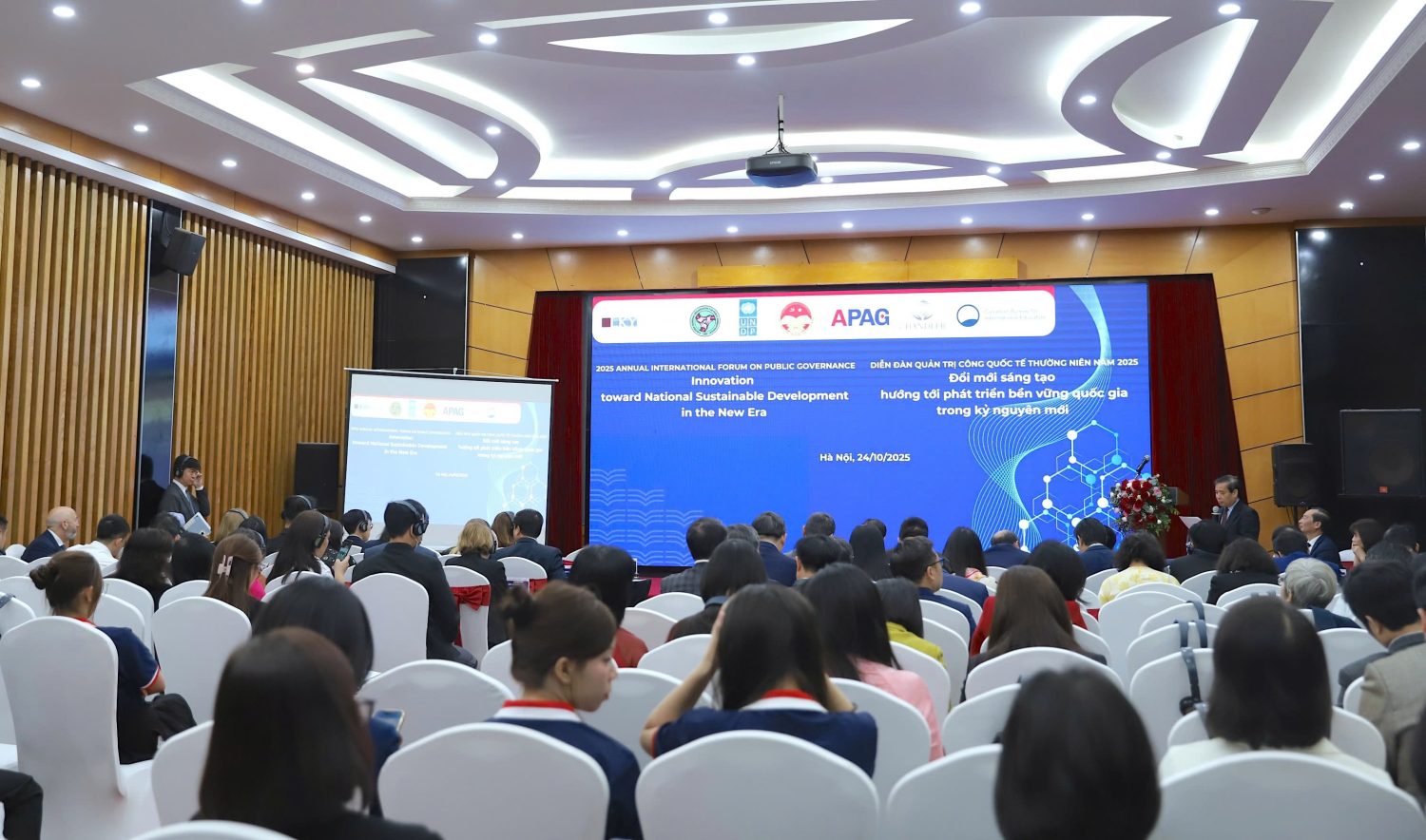 At the Forum.
At the Forum.
Attending the Forum were Assoc.Prof.Dr. Nguyen Manh Hung, Vice President of HCMA and Vice Chairman of the Central Council on Theoretical Studies; representatives from central and local ministries, agencies, and organizations; along with a large number of experts and scholars from Viet Nam and abroad.
Representing international organizations were Ms. Ramla Khalidi, UNDP Resident Representative in Viet Nam; Ms. Diana Torres, Regional Governance Advisor, UNDP Bangkok Regional Hub; Mr. Wu Wei Neng, CEO of CIG (Singapore); Prof.Dr. Alex Brillantes Jr., Secretary-General of EROPA; Dr. Noor Maya Salleh, Director of the Brunei Civil Service Institute, representing the ASEAN Public Service Training Institutes Network (PSTI); and Prof. Dr. Vu Minh Khuong from the Lee Kuan Yew School of Public Policy (Singapore). Also present at the Forum were ambassadors and representatives from diplomatic missions, including the embassies of Laos, Canada, the Republic of Korea, Australia, Singapore, and Bangladesh, as well as representatives from the JICA Viet Nam Office, the German Agency for International Cooperation (GIZ), and the Vietnam–Australia Centre. The Forum also welcomed scholars from universities such as the University of the Philippines and Makati University (Philippines), as well as UNDP experts.
Representing APAG were Assoc.Prof.Dr. Nguyen Ba Chien, President of APAG; members of the APAG Board of Directors; leaders of its affiliated and subordinate units; lecturers; learners; and doctoral candidates.
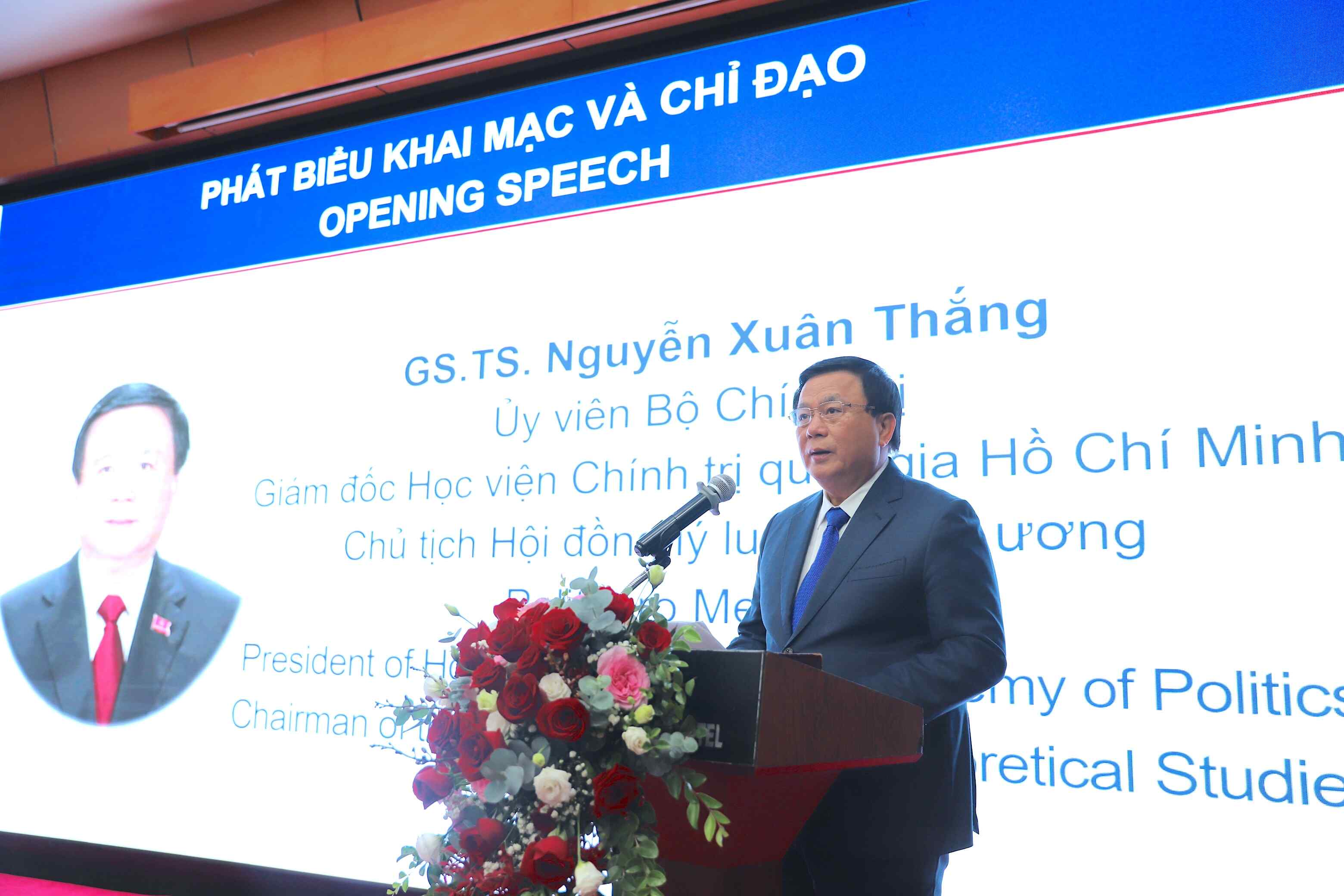 Prof. Dr. Nguyen Xuan Thang, Member of the Politburo, President of the Ho Chi Minh National Academy of Politics (HCMA), and Chairman of the Central Council on Theoretical Studies, delivers the opening speech.
Prof. Dr. Nguyen Xuan Thang, Member of the Politburo, President of the Ho Chi Minh National Academy of Politics (HCMA), and Chairman of the Central Council on Theoretical Studies, delivers the opening speech.
In his opening speech at the Forum, Prof. Dr. Nguyen Xuan Thang, Member of the Politburo, President of HCMA, and Chairman of the Central Council on Theoretical Studies, affirmed that the Forum takes place at a particularly significant moment. Viet Nam has just celebrated the 80th anniversary of the August Revolution and National Day on September 2, rekindling national pride, confidence, and the aspiration for a strong, prosperous, civilized, and happy nation. This is also the time to look back on the path, reshape the mindset, and set forth new visions, policies, and strategic actions for a new phase of development - an era of innovation, digital transformation, and sustainable growth.
Prof.Dr. Nguyen Xuan Thang emphasized that in the context of rapid global transformations driven by technological revolutions in artificial intelligence, big data, cloud computing, and next-generation technologies, innovation has become the central source of national competitiveness. Around the world, many governments have shifted from “administrative management” to “development-oriented governance,” viewing governance capacity as a key measure of national strength. In Viet Nam, the Communist Party of Viet Nam has identified innovation as a critical driving force that must be institutionalized and measured through the people’s trust -consistent with the guidance of Party General Secretary To Lam: “Innovation must not remain a slogan; it must yield tangible results.”
In 2025, administrative reform is being strongly advanced toward a lean, integrity-based, and effective civil service, in which every public servant becomes an agent of innovation - one who dares to think, to act, and to take responsibility. Science and technology, innovation, and digital transformation have been defined as the three pillars of development: the digital economy, the data economy, and digital government.
He stressed the need to position science and technology, innovation, and digital transformation as the primary drivers of national progress, built on three pillars: the digital economy, the data economy, and digital government. At the same time, institutional bottlenecks must be removed, and the leading role of the State of Viet Nam in shaping a comprehensive innovation ecosystem must be strengthened - one in which enterprises serve as the core, educational and research institutions act as the launchpads of knowledge, and state management agencies function as coordinating hubs.
Upholding the central role of HCMA in theoretical research and cadre training, APAG has been entrusted with accompanying the process of institutional reform and modernization of Viet Nam’s civil service. APAG not only focuses on training and developing leadership, administrative, and governance capacity for public officials and civil servants, but also emphasizes cultivating innovation capability, strategic thinking, and adaptability in the digital transformation era. At the same time, APAG serves as a center for research, policy consultancy, and recommendation - providing both theoretical and practical foundations for formulating national development strategies.
Prof.Dr. Nguyen Xuan Thang affirmed that in the age of artificial intelligence and the digital economy, innovation is not only a driver of growth but also the foundation of modern national governance. A nation can only achieve sustainable development when every policy, institution, and public official knows how to innovate and to serve. Innovation must become a culture of action across the entire system, linking the State, academia, and business, to create synergistic strength in administrative reform and enhance national productivity.
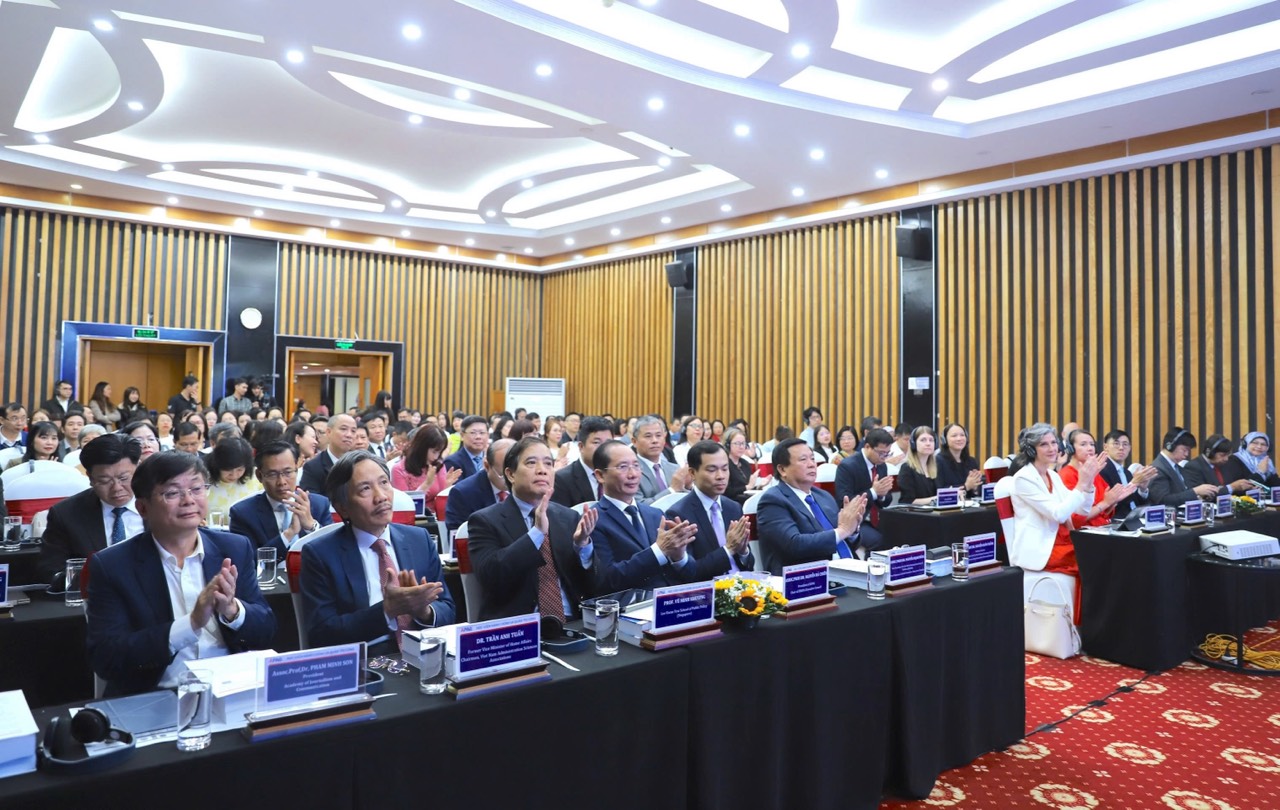 Forum participants.
Forum participants.The Annual International Forum on Public Governance is an important academic and policy initiative of APAG, creating an open dialogue platform among domestic and international scholars, leaders, and experts. The participation of organizations such as UNDP, EROPA, PSTI, CIG, CBIE, and the Lee Kuan Yew School of Public Policy demonstrates a strong commitment to international cooperation and joint action toward an innovative, effective, and people-centered public governance system. The Forum also aims to spread the spirit of innovation and to ignite the aspiration to build a sustainable, developed nation, oriented toward a modern, transparent, and service-oriented civil service.
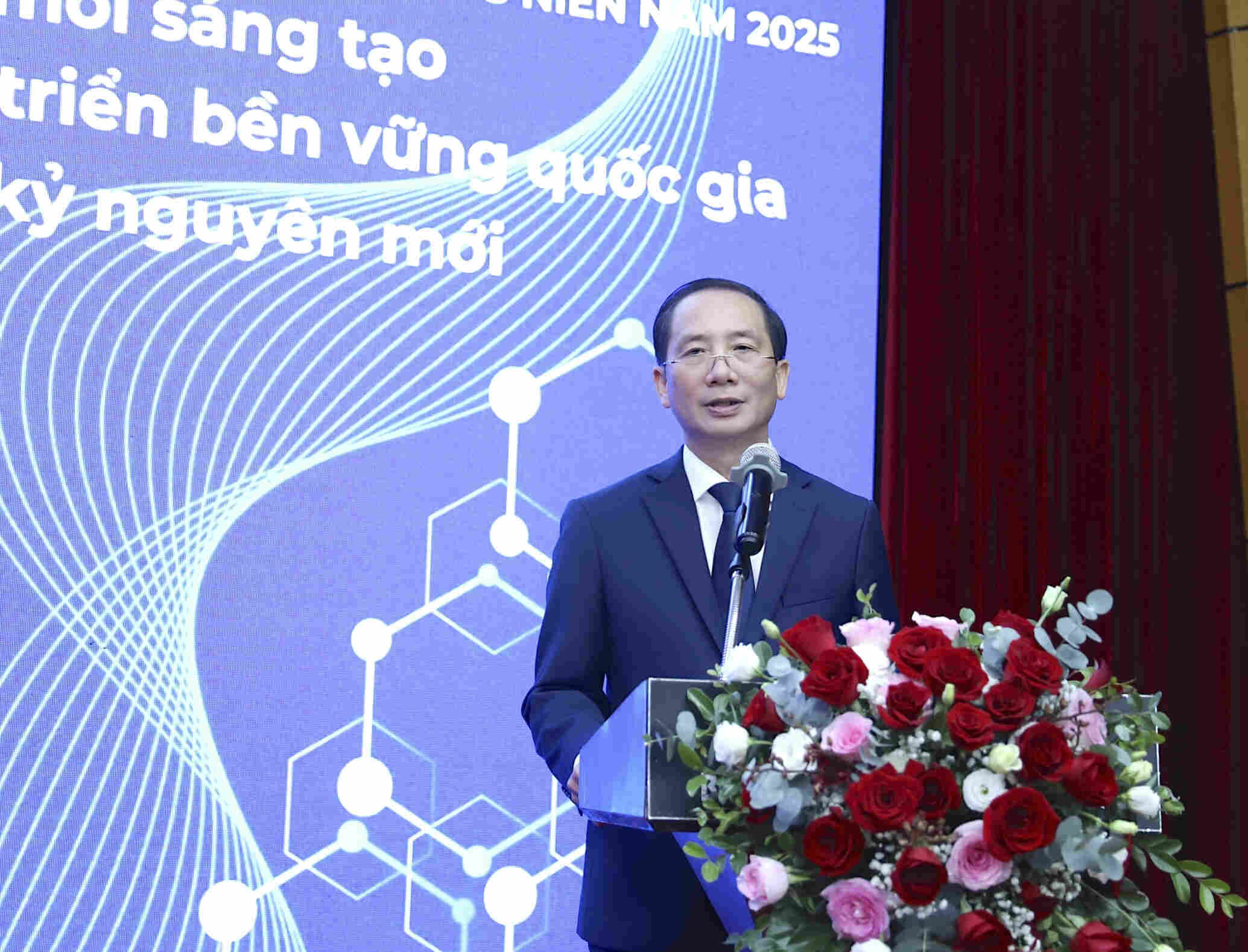 Assoc.Prof.Dr. Nguyen Ba Chien, President of APAG, delivers the keynote address.
Assoc.Prof.Dr. Nguyen Ba Chien, President of APAG, delivers the keynote address.In his keynote speech, Assoc.Prof.Dr. Nguyen Ba Chien expressed his sincere appreciation to Prof.Dr. Nguyen Xuan Thang, Politburo Member and President of HCMA, for his strategic and visionary opening speech, which reaffirmed the Party’s commitment to renewing mindsets and actions in leadership, governance, and national development. This year’s Forum aims to concretize that spirit by focusing on innovation as a key driver for sustainable development and enhanced national governance capacity.
Assoc.Prof.Dr. Nguyen Ba Chien emphasized the directive of Party General Secretary To Lam on building a “State that is innovative, transparent, developmental, and people-centered,” viewing innovation as a systemic capacity across the entire political apparatus, measured by the effectiveness of public service and public trust. Innovation, he noted, is not limited to technology but represents a fundamental transformation in governance thinking, from administrative control to developmental facilitation, and from serving citizens to co-creating public value with them.
According to Assoc. Prof. Dr. Nguyen Ba Chien, building a national innovation ecosystem is an urgent necessity, where the State, enterprises, educational institutions, and society collaborate in creating and sharing knowledge. Within this system, HCMA is positioned as the country’s political and theoretical hub, while APAG carries a dual mission: to train and foster public governance capacity and to act as the knowledge center of innovation within Viet Nam’s public sector, transforming theory into actionable capacity. APAG is gradually transitioning from being a “a place of knowledge transmission” to “a place of innovation capacity building”; from “learning to know” to “learning to act and to innovate”; and from “teaching administration” to “incubating innovation capability, creativity, and policy thinking.”
With the theme “Innovation toward National Sustainable Development in the New Era,” this year’s Forum focuses on major topic areas: (1) Vision and theory: The role of innovation in sustainable development and in building a national innovation ecosystem; (2) Policy action: Translating innovation vision into concrete public-sector policies; (3) Human resources and system linkage: Strengthening the connection between training institutions and local governments to foster innovation capacity; (4) Innovation capacity and cooperation: The role of local governments and academic institutions in building national innovation capacity; (5) Systemic vision: Positioning training institutions such as HCMA and APAG as national knowledge hubs of innovation, bridging academia and practice.
The Forum’s discussion outcomes will be synthesized into a policy recommendation report to support research, teaching, and policymaking, thereby contributing to concretizing the spirit of innovation in line with the orientations of the Party and the State of Viet Nam.
Assoc. Prof. Dr. Nguyen Ba Chien expressed his gratitude to HCMA, the Ministry of Home Affairs, the Ministry of Science and Technology, experts, and international partners such as UNDP, CIG, EROPA, PSTI, the Lee Kuan Yew School of Public Policy, and CBIE for their collaboration and support in organizing the Forum. He expressed his belief that, under the leadership of HCMA and through strong domestic and international cooperation, APAG will continue to affirm its position as a leading knowledge center in public governance innovation, bridging theory and practice, Viet Nam and the world, for a modern, effective, and sustainable system of public governance.
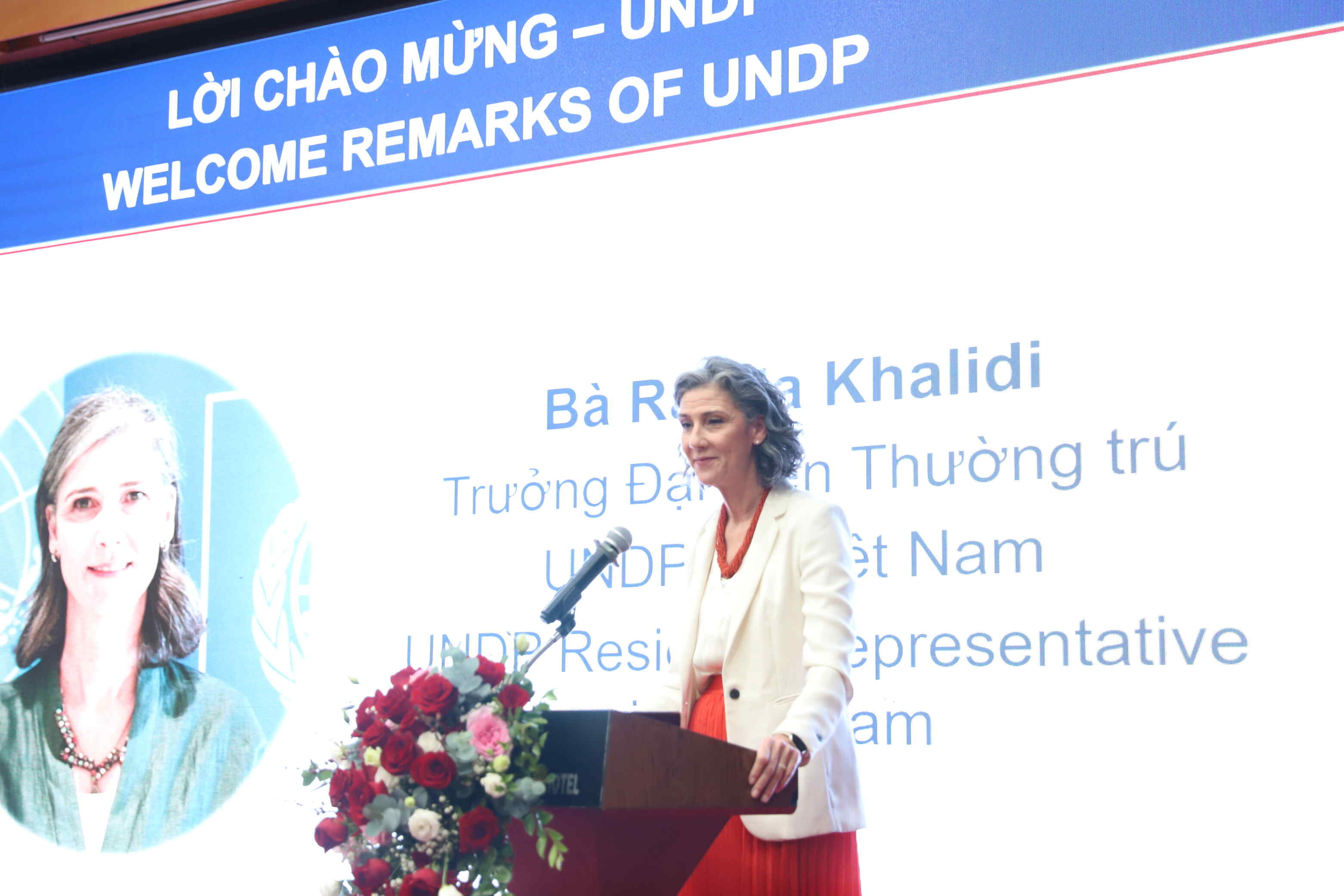 Ms. Ramla Khalidi, UNDP Resident Representative in Viet Nam, delivers welcome remarks.
Ms. Ramla Khalidi, UNDP Resident Representative in Viet Nam, delivers welcome remarks.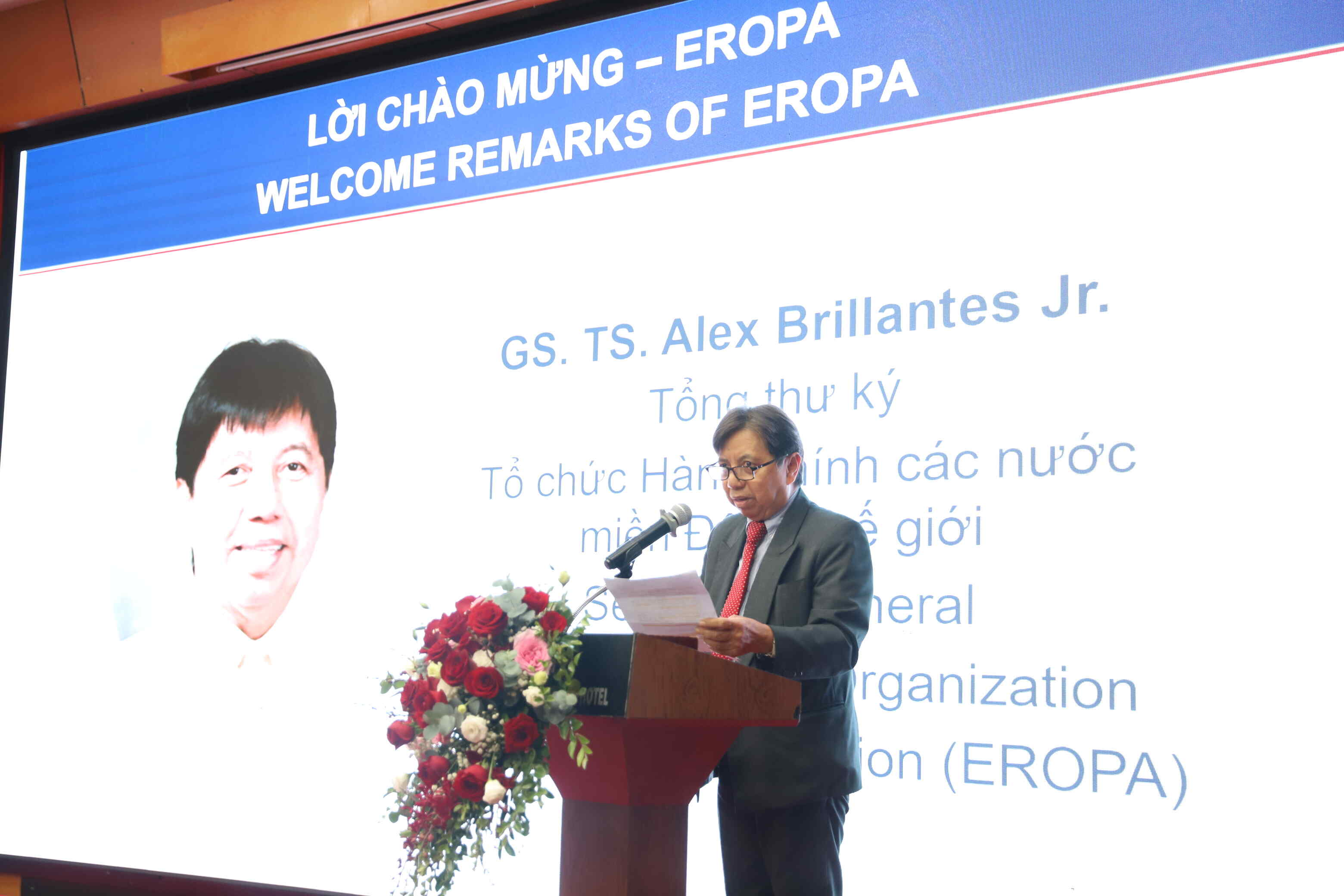 Prof.Dr. Alex Brillantes Jr., Secretary-General of EROPA, delivers welcome remarks.
Prof.Dr. Alex Brillantes Jr., Secretary-General of EROPA, delivers welcome remarks.
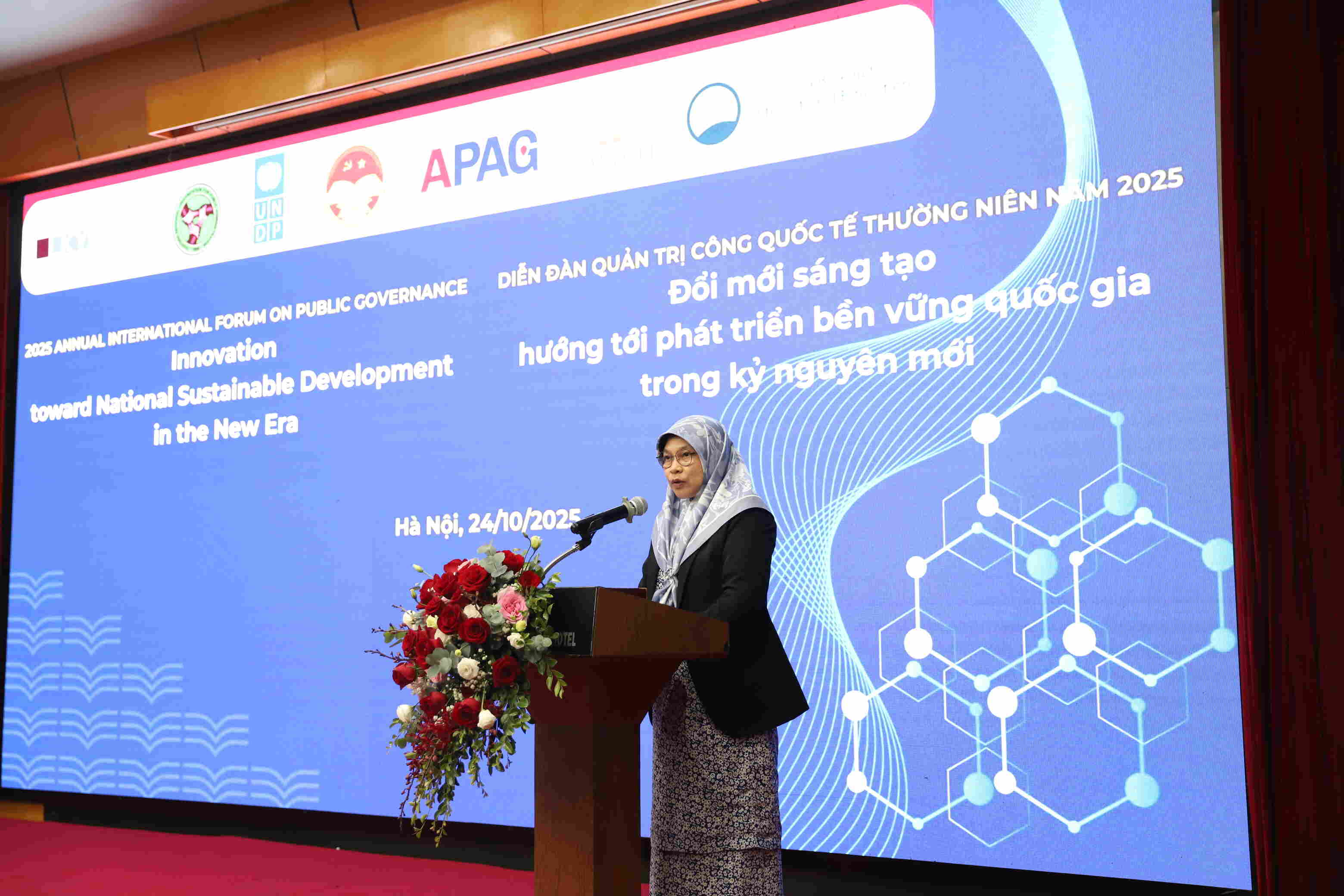 Dr. Noor Maya Salleh, Director of the Brunei Civil Service Institute, representing the ASEAN PSTI Network, delivers welcome remarks.
Dr. Noor Maya Salleh, Director of the Brunei Civil Service Institute, representing the ASEAN PSTI Network, delivers welcome remarks.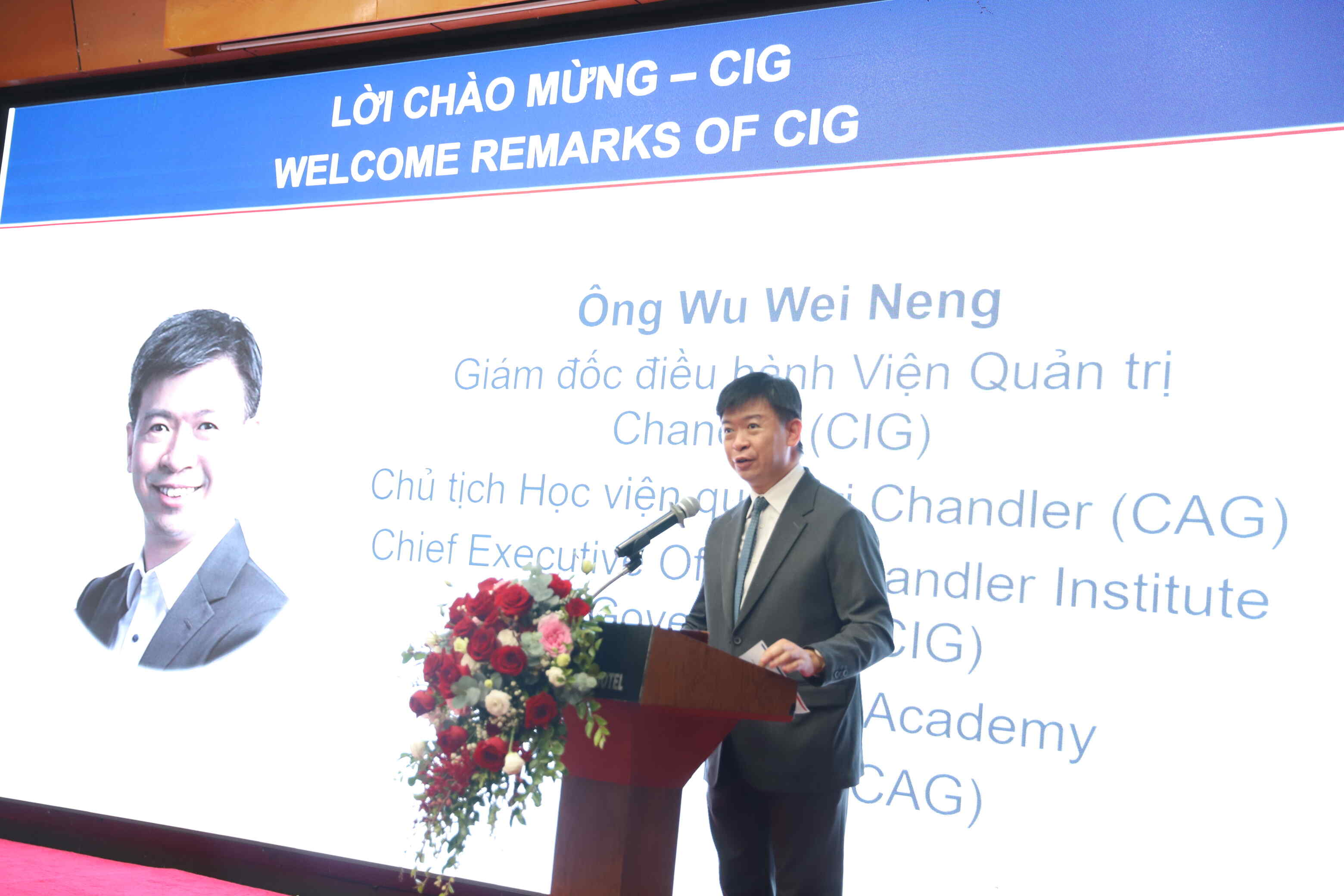 Mr. Wu Wei Neng, CEO of CIG (Singapore), delivers welcome remarks.
Mr. Wu Wei Neng, CEO of CIG (Singapore), delivers welcome remarks.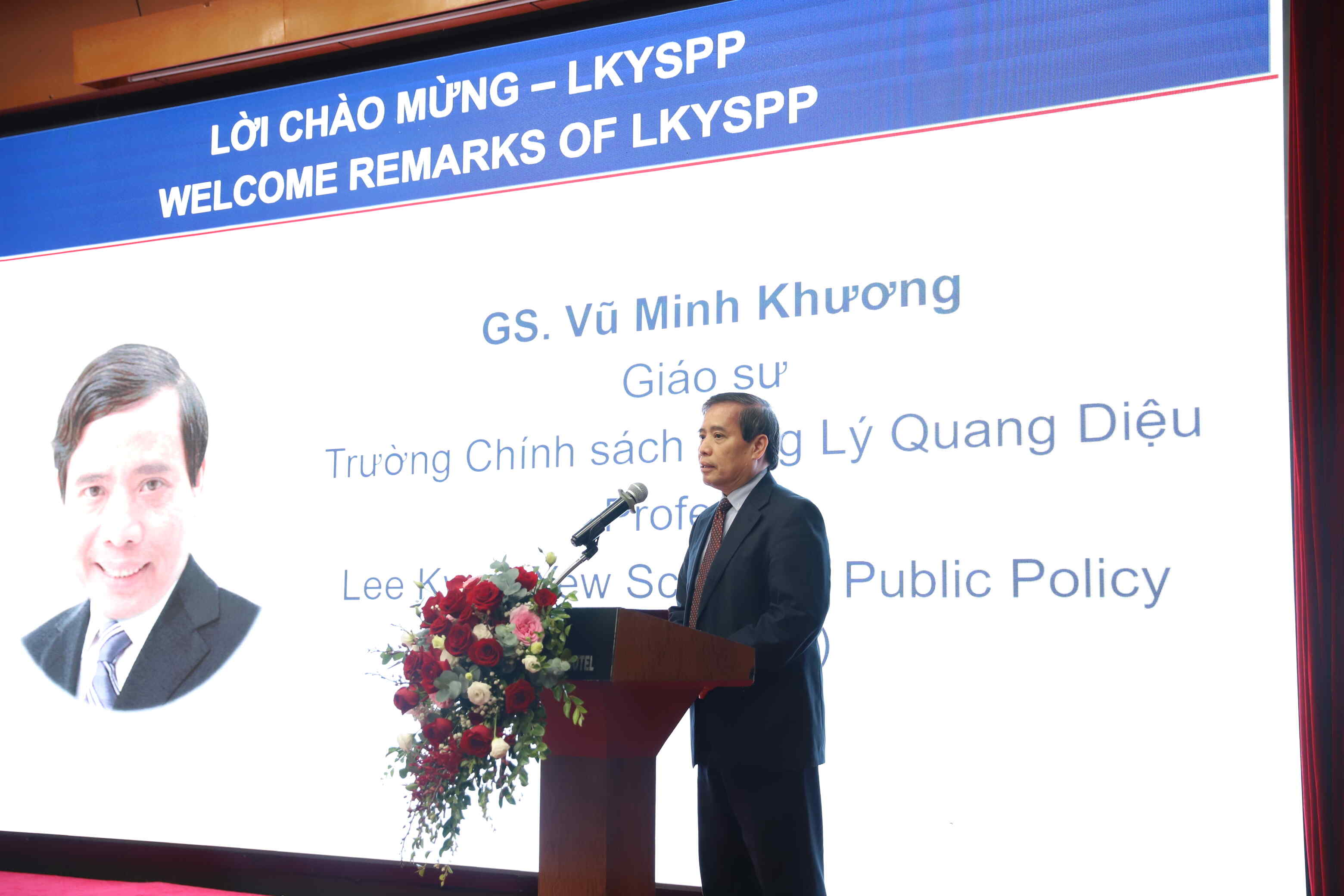 Prof. Dr. Vu Minh Khuong from the Lee Kuan Yew School of Public Policy (Singapore) delivers welcome remarks.
Prof. Dr. Vu Minh Khuong from the Lee Kuan Yew School of Public Policy (Singapore) delivers welcome remarks. Ms. Karen Dalkie, Vice President, Development and Partnerships, CBIE, delivers welcome remarks.
Ms. Karen Dalkie, Vice President, Development and Partnerships, CBIE, delivers welcome remarks.In their welcoming remarks at the 2025 Annual International Forum on Public Governance, representatives of international organizations such as UNDP, CIG, LKYSPP, CBIE, EROPA, and ASEAN PSTI Network expressed their honor to participate in the event. The delegates extended their appreciation to HCMA and APAG for organizing such a meaningful forum at a time when Viet Nam is entering a new stage of development marked by profound economic, political, technological, and social transformations.
They all emphasized that fostering innovation, science and technology, and digital transformation is an urgent requirement to realize the aspiration of building a strong and prosperous nation. The participation of a large number of domestic and international delegates, experts, and scholars demonstrates a strong spirit of cooperation, connection, and knowledge sharing among countries, organizations, and research institutions - all aiming to enhance the effectiveness of public governance, develop high-quality human resources, and build a modern, transparent, and people-centered administration.
Representatives of international organizations expressed confidence that through its discussion sessions, the Forum would contribute to strengthening cooperation, sharing knowledge, and building sustainable partnerships in the fields of training, research, and public governance practice.
The Forum comprises four main sessions, held on October 24, 2025:
Session 1: Innovation – the driving force for sustainable development in the new era.
Session 2: Policy dialogue - Innovation in the public sector - From vision to policy action.
Session 3: Strengthening the link between educational institutions and local governments in innovation.
Session 4: Roundtable discussion - Building innovation capacity: The role of training institutions and local governments in the current context of Viet Nam.
The discussions will focus on clarifying the role of innovation, science and technology, and digital transformation in modern public governance; sharing international experiences in developing innovative leadership capacity and applying artificial intelligence (AI) in policy formulation and implementation; promoting collaboration between training institutions and local governments; and exchanging experiences from Vietnamese localities in innovating public service delivery.
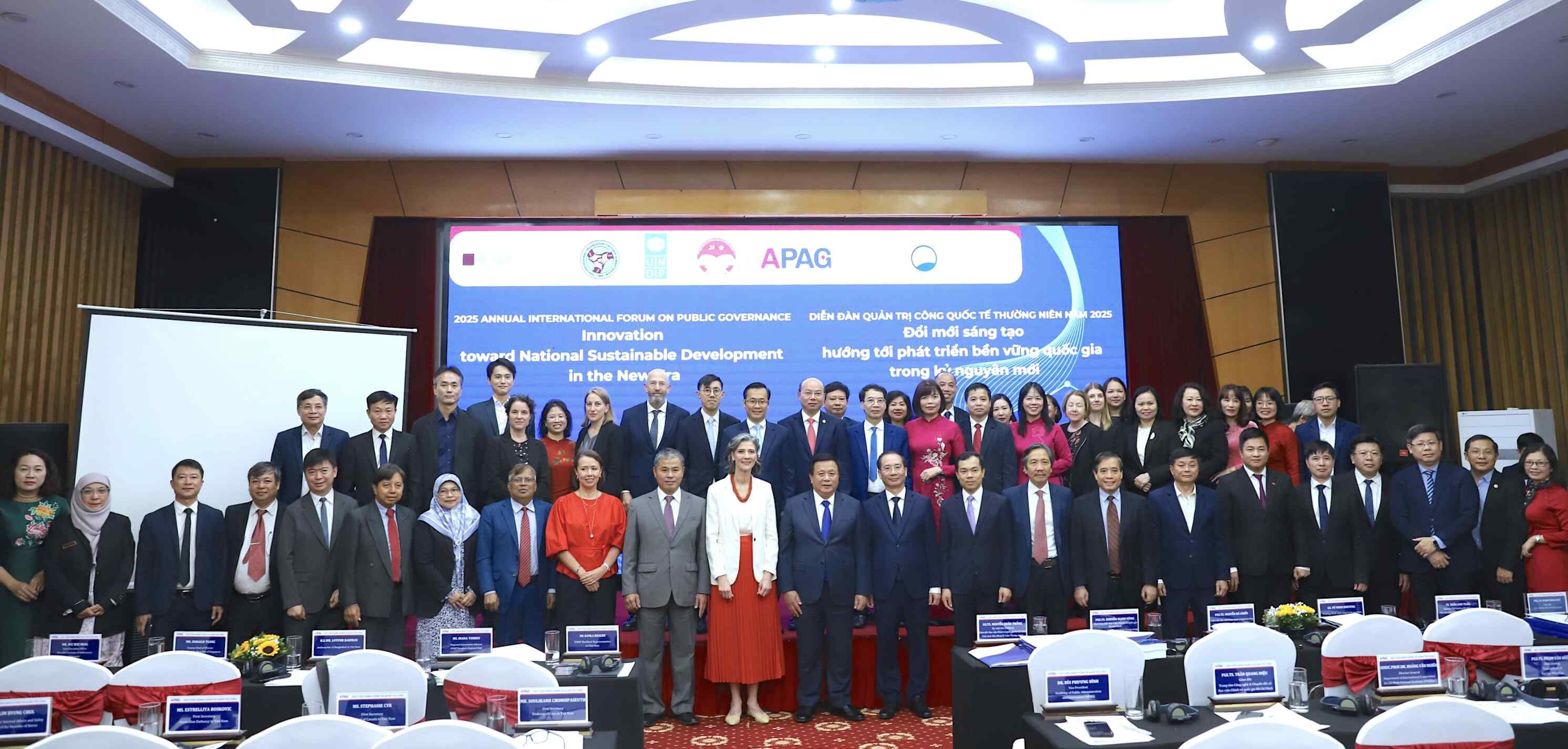 Forum participants.
Forum participants.